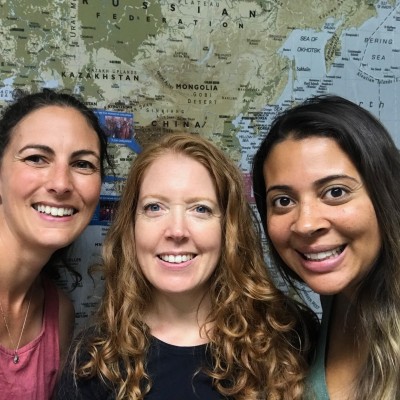Find out more about the programme and how Martha used her loan to set up a thriving sewing business.
In Kyaka II refugee settlement, Uganda, our early years education programme is working with local communities to provide education to over 4000 of the youngest children. Our award-winning Cluster Learning Model offers small group lessons for children aged 3-6, outside, near their homes in ‘cluster groups’.
A key component of the programme is to involve the whole community, so that early years education can be sustained after we have gone. Local people are trained to teach as ‘caregivers’, so the children can learn in a familiar, safe environment, with adults who speak their language.
Experienced caregivers are given regular extra training to become ‘Trainers of Teachers’ (ToTs), otherwise known as ‘Superteachers’ who then support and train newer caregivers and offer mentorship and advice.
Parents and community members are also involved in Cluster Learning Management Committees and get fully involved in the management and running of the cluster groups in their communities.
All caregivers are given stipends and training, but run the cluster classes voluntarily, without a salary. So, to make the programme as sustainable as possible, and ensure that caregivers are able to support themselves and their families’ financially, we offer ‘microloans’, alongside training. Microloans are also open to parents, and the system is inherently owned by the community.
Small business loans of UGX 200,000 (around £43) are given to recipients, alongside some training so that they can invest in setting up their own small business which bring in vital income for their families and enable them to keep teaching or supporting their children.
In 2023, 198 caregivers were supported to form their own ‘Teacher Zonal Groups’ in the respective zones of the settlement where they live and work. After taking part in the training, members submit business plans for things like vegetable stalls, palm oil businesses, clothing and retail shops. They then receive a small business loan, together with business and financial training.
The groups are registered as financial institutions with their own bank accounts and the members themselves disburse the loans to individual caregivers, to be paid back within six months at 10% interest, in order to grow funds and support more businesses.
Parents have been expressing how difficult it is for them to financially support the cluster groups when they have so little money themselves. As a result, we now have parent and community ‘Village Loans and Savings Associations’ (VLSA) groups, so members can save to buy materials for cluster groups, contribute to teacher stipends and generate their own business loans. 15 study areas have started parent VSLAs so far, and others are in the process of being formed.
With this decentralised loans system, we aim to better serve our wider goal of establishing community ownership and sustainability, not only for the programme, but to improve the economy and quality of life across the camp.
Martha, a Congolese refugee in Kyaka II settlement, relied on UNHCR food rations to survive, despite being a skilled tailor. She couldn’t afford a sewing machine to restart her tailoring business. In 2022, she trained as an early years teacher with Children on the Edge and began teaching in Kaborogota zone.
With financial literacy training and a small business loan, Martha bought a second-hand sewing machine. She now earns a steady income by sewing traditional Congolese fabric and repairing clothes. Teaching in the mornings and tailoring in the afternoons, Martha supports her young siblings and cares for her ailing mother with her improved income.



